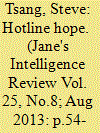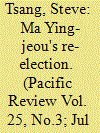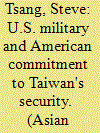| Srl | Item |
| 1 |
ID:
129153


|
|
|
| 2 |
ID:
067535


|
|
|
|
|
| Publication |
London, Routledge, 2006.
|
| Description |
xviii, 215p.
|
| Series |
Asian security studies
|
| Standard Number |
9780415380188
|
|
|
|
|
|
|
|
|
|
|
|
Copies: C:2/I:0,R:0,Q:0
Circulation
| Accession# | Call# | Current Location | Status | Policy | Location |
| 050557 | 355.033551/TSA 050557 | Main | On Shelf | General | |
| 054817 | 355.033551/TSA 054817 | Main | On Shelf | General | |
|
|
|
|
| 3 |
ID:
075570


|
|
|
|
|
| Publication |
Westport, Praeger Security International, 2007.
|
| Description |
xv, 224p.
|
| Standard Number |
0275992519
|
|
|
|
|
|
|
|
|
|
|
|
Copies: C:1/I:0,R:0,Q:0
Circulation
| Accession# | Call# | Current Location | Status | Policy | Location |
| 052094 | 327.12/TSA 052094 | Main | On Shelf | General | |
|
|
|
|
| 4 |
ID:
113722


|
|
|
|
|
| Publication |
2012.
|
| Summary/Abstract |
Ma Ying-jeou's re-election means that there will not be a leadership change in Taiwan, but it still has significant implications. It forces the opposition Democratic Progressive Party (DPP) to work out a succession for itself and confront the political reality that it must now persuade voters in Taiwan that it can manage relations with mainland China effectively in order to win the presidency again. It also requires Ma to define clearly the limits of his mainland policy in order to minimize Beijing's expectations of his second term, as no president of Taiwan can agree to move towards political integration without a popular mandate. On its part, Beijing has taken on board the significance of Taiwan's electoral cycle for managing cross-Strait ties and will put pressure on Ma to move forward over political integration and thus reduce the scope for a future DPP administration to reverse course. This notwithstanding, Beijing's Taiwan policy will ultimately be determined more by the result of the leadership succession in mainland China itself in the autumn of 2012. For USA and East Asia, Ma's re-election is a positive development as it minimizes the risk of a confrontation or a crisis across the Taiwan Strait. But it will not remove the main problems they have with China that are Taiwan related. For USA, arms sales to Taiwan will still be needed and will remain a source of tension with Beijing. For Southeast Asia, stability across the Taiwan Strait implies that Beijing can devote more attention and resources to the South China Sea territorial disputes and that it is likely to behave in a more assertive way.
|
|
|
|
|
|
|
|
|
|
|
|
|
|
|
|
| 5 |
ID:
171043


|
|
|
|
|
| Summary/Abstract |
The author puts forth an analytical framework called party-state realism for understanding how policy makers in the People’s Republic of China approach foreign policy. It has four defining characteristics. In order of importance, they are: putting the interests of the Communist Party at the core of China’s national interest calculation; and on this basis adopting an instrumentalist approach; adopting a party-centric nationalism; and adhering to a neoclassical realist assessment of the country’s place in the international system and its relative material power in advancing national interest. In this conception, the putting of the Chinese Communist Party’s interest at the core of national interest is a constant, not a variable, factor. This does not mean the changing international context and relative national power are irrelevant, just that they take secondary importance.
|
|
|
|
|
|
|
|
|
|
|
|
|
|
|
|
| 6 |
ID:
114653


|
|
|
|
|
| Publication |
2012.
|
| Summary/Abstract |
This article focuses on how the U.S. military assesses the threat of a Taiwan Strait crisis
over the next two decades, America's possible responses, and the U.S. capacity for
effective intervention. It examines the drivers behind the U.S. approach, highlighting
their implications.
|
|
|
|
|
|
|
|
|
|
|
|
|
|
|
|
| 7 |
ID:
060600


|
|
|